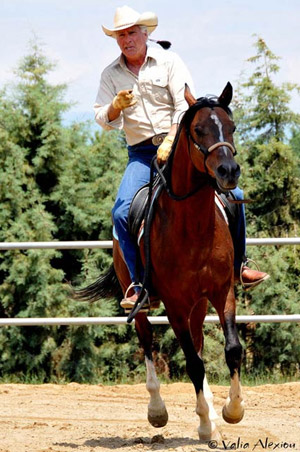Home : Articles About Franklin : Famed American Horseman Visits Greece
Famed American Horseman Visits Greece
By Wes Johnson, 2009
 Internationally known American horseman Franklin Levinson has returned to Greece and is available for consultations and group lessons until August.
Internationally known American horseman Franklin Levinson has returned to Greece and is available for consultations and group lessons until August.
You might ask what can American can teach Greeks about horsemanship? After all, Xenophon wrote his classic work on horses and riding over two thousand years ago. Alexander the Great and Bucephalas followed … his cavalry blazing trails of glory. Not even a hundred years ago Greek cavalry swept all before it in the Balkan Wars and World War I. What can Levinson teach the Greeks? Well, quite a lot, actually!!!
Levinson, of Maui in Hawaii and Snowmass, Colorado, has earned a large following of riders in the United States, the United Kingdom and Ireland, Europe, and Australia because of his “tested in the saddle” approach to the horse and riding that takes his adherents far beyond the so-called school of “natural horsemanship”. Levinson is quick to observe that our modern horse lives in an environment anything, but natural. However, he emphasizes that for a successful relationship with our equine friends it is necessary for us to learn how to get inside the horse’s mind. He has named his approach “Training Thru Trust” and this summer he has teamed up with Ilona Staikou, a Budapest-schooled instructor with years of experience teaching riding in Athens, who both shares Franklin’s love of horses – and his tested methods. They can be contacted at the following: franklin@WayoftheHorse.org and ilonasta@otenet.gr Phone numbers 6945531976, 6956921988.
Comments that follow were adopted from Levinson’s website.
We strive for excellence in the horse-human relationship, a higher level of horsemanship. Above all, this requires human compassion and the patience to understand both the horse’s mind and its instinctual way of behavior, of how it reacts to protect itself. The Beyond Natural Horsemanship approach is gentle, but effective. Most often, there is very little that is “natural” in how we humans go about training horses. Our egos tend to get in the way. When things are going well, it seems easy. But when problems arise, anger, blame, and hostility takeover. Our frustration leads to the use of force. Then we say the horse is bad, stubborn, or disobedient. Actually, the horse is innocent of all this and is misjudged and misunderstood. We must have compassion and empathy to understand that the horse is a prey animal whose every instinct is based on survival – to flee to avoid any real, or suspect danger… or to fight! To “flee, or fight” is the rule they live by. That being so, fear is a major part of a horse’s life, a kind of mental suffering and pain. An aggressive horse is equally innocent and is such because of what it has experienced. It doesn’t deserve punishment, much as a small child should not be punished for an act it doesn’t understand. But, though our compassion and patience we will gain wisdom, knowledge, and understanding. And, with time and experience, we will gain the ability to apply learned skills to a problem. It is not at all easy, for the horse remains much of a mystery to most humans – a creature of the wild. But, obviously, our horse doesn’t live in the wild and must be cared for to be used and enjoyed. And, that time spent caring for and training a horse will necessarily increase our skill level, our level of horsemanship. Time in the saddle is essential despite the fact that our busy way of life works against the need to spend long hours observing a horse’s behavior as a herd animal.
The horse learns to trust the herd leader. It relies on the leader for its safety. Likewise, our horse can learn to transfer that same trust to a human being – to rely on that person to do the right thing, to provide safety in executing a learned horse skill be it jumping, or dressage, or simple ring maneuvers. A horse must feel safe with the rider and a rider must feel safe with the horse. Once it has learned it is safe, it will do what it is properly asked to do, be it taking a ditch, or a jump. Once we humans learn to ride correctly, our equine friend submits willingly and happily – ears forward and relaxed, getting the best performance from its superb, beautiful, body. We must learn to be the great herd leader. We will then be rewarded by the best a horse is capable of giving. Good riding is universal. There is no inherent conflict between the English and Western styles. If you have an open mind, Franklin Levinson invites you to learn “Training Thru Trust”. He has over four decades of experience to share with you!
Wes Johnson is a former U.S. diplomat who rides at Varibopi Riding School in Athens.
RETURN TO ARTICLES ABOUT FRANKLIN
